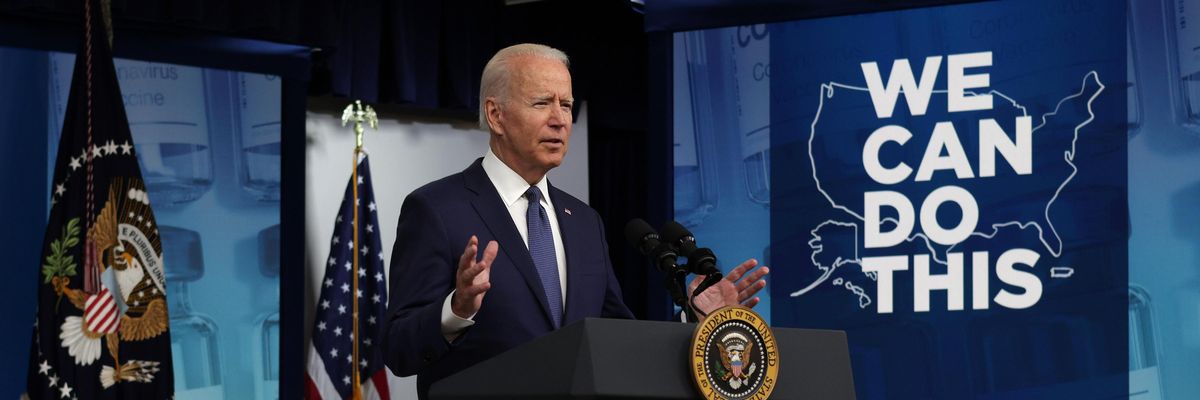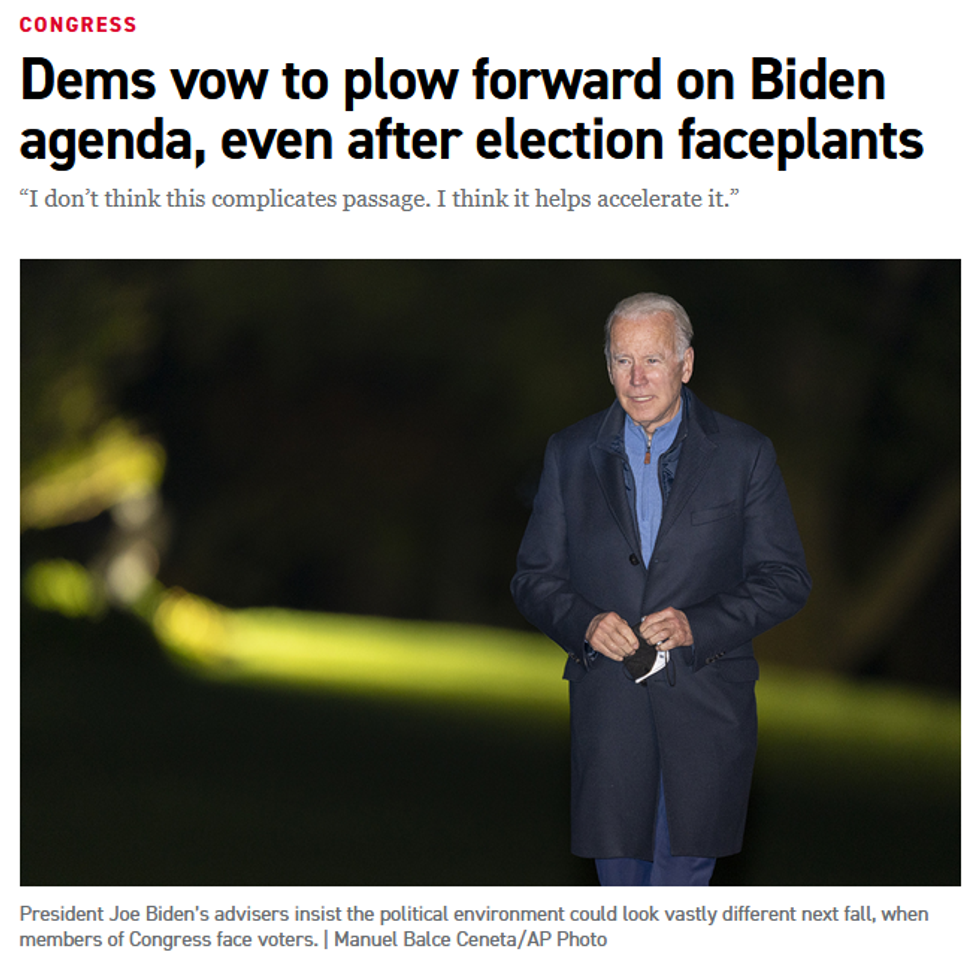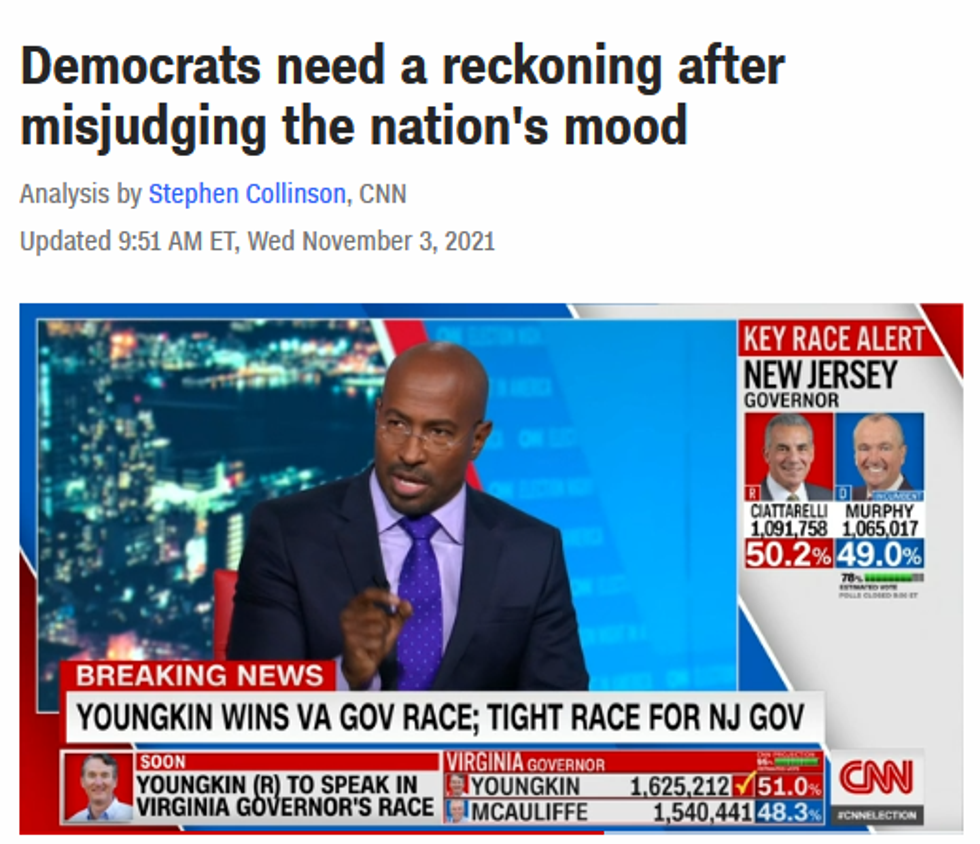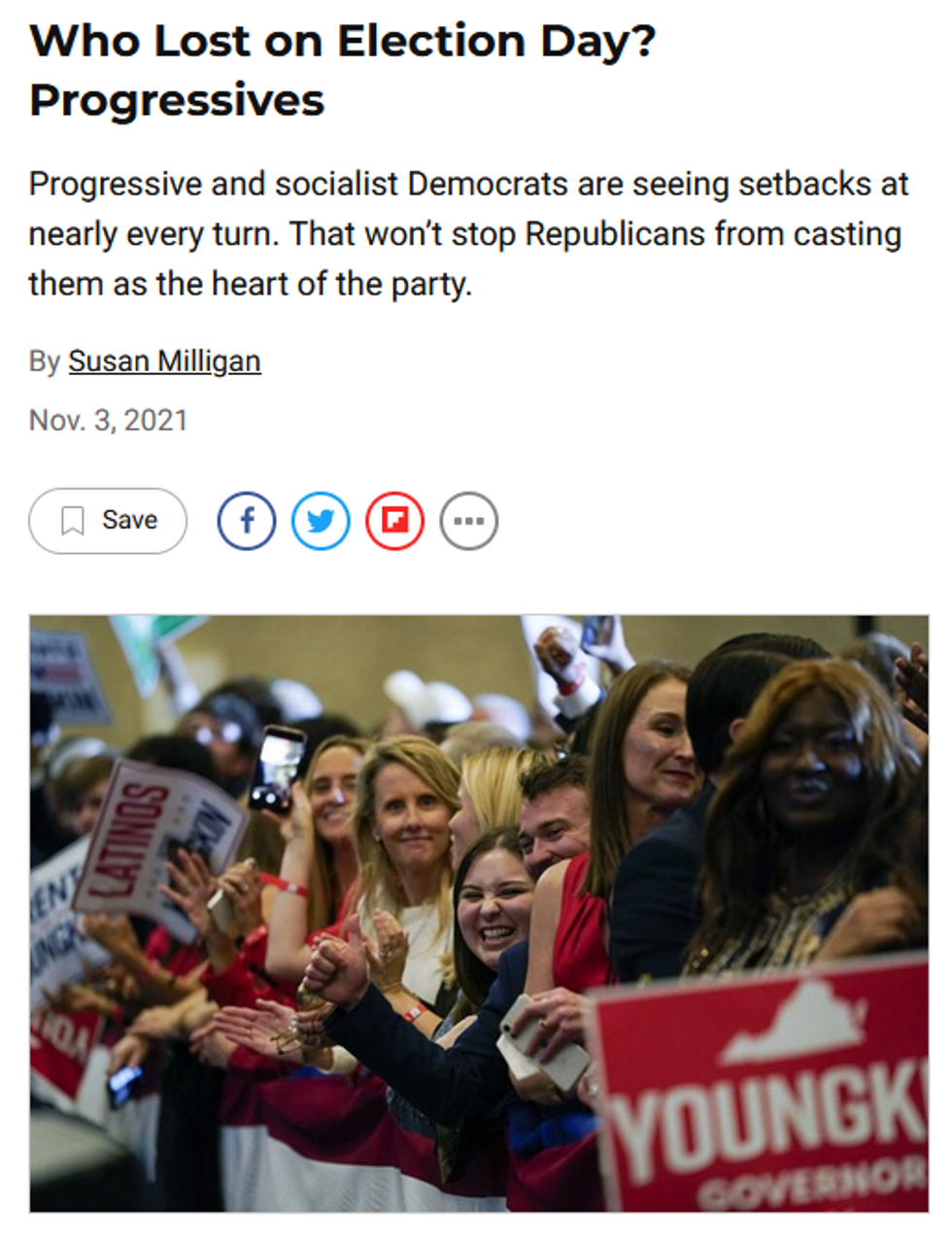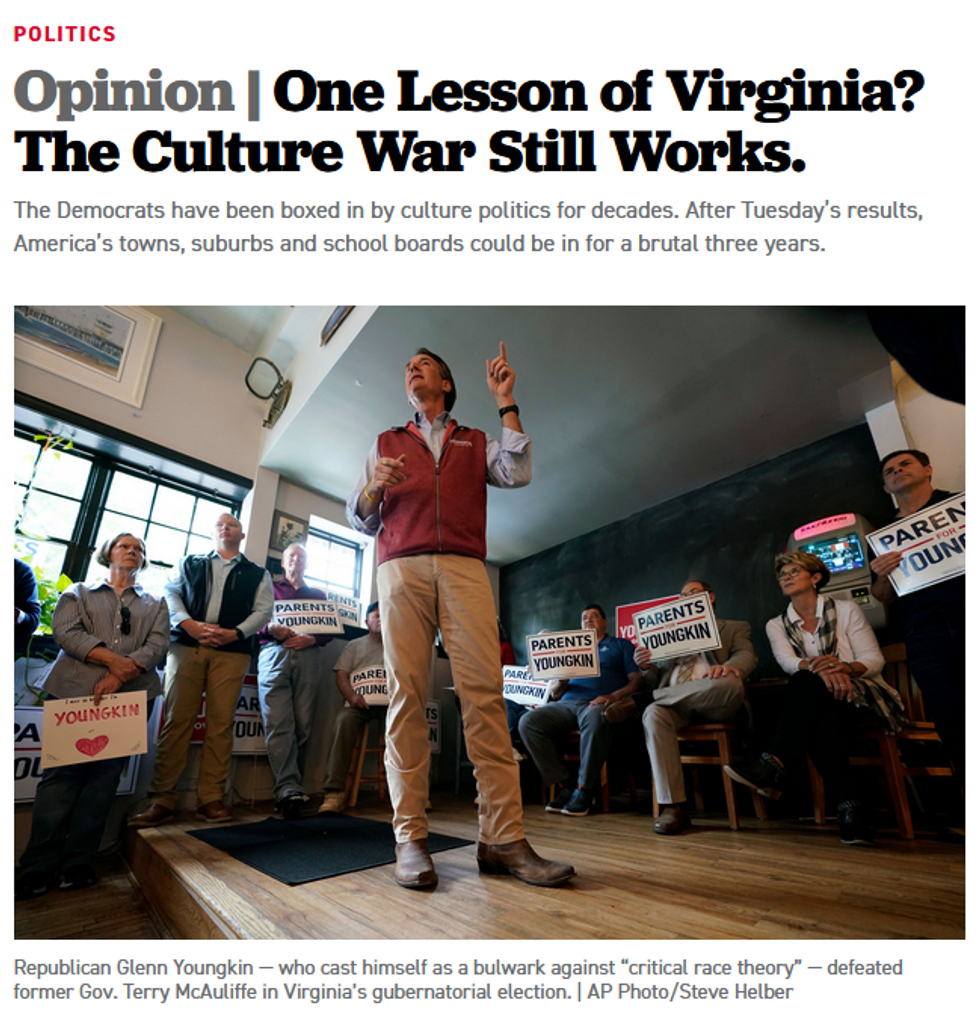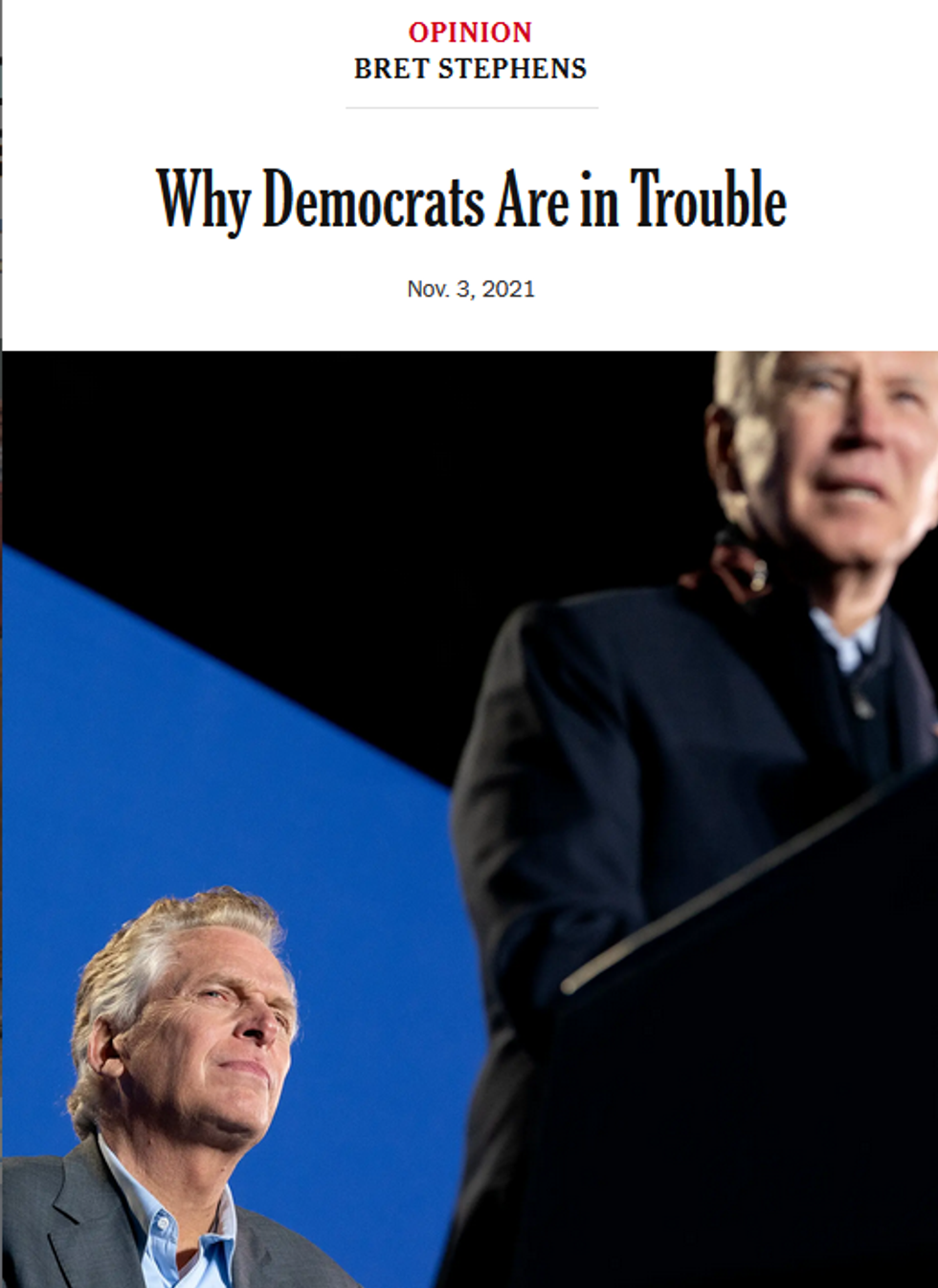After the 2021 elections, in which Democrat Terry McAuliffe lost the closely watched Virginia governor's race to Republican Glenn Youngkin, many in corporate media coalesced around a set of lessons for Democrats--question Biden's "ambitious" agenda, blame progressives, and disavow anti-racism--that echoed the same overarching moral they repeat year after year, seemingly regardless of outcome: Move to the right.
'Doubts for Biden agenda'

Politico (11/3/21) reported that Democratic Party"moderates blamed progressives for withholding their support for Biden's massive infrastructure bill."
"Dems Vow to Plow Forward on Biden Agenda, Even After Election Faceplants," announced Politico's top headline (11/3/21) the day after the election.
Time (11/3/21) suggested that,
a McAuliffe defeat, at least in part based on a[n infrastructure] bill that hasn't even been passed, is sure to rattle legislators who may interpret the voters' wrath as a rejection of the party's current agenda.
"Elections Spur Doubts for Biden Agenda, Party's Outlook," declared the Washington Post's home page (11/3/21). The Post seemed to be on auto-pilot with its headline and the lead of the accompanying story, spooling out the theme that Democrats are moving too far to the left with virtually no supporting evidence:
Democrats reeling from the party's showing on Tuesday night were sharply critical of its direction and agenda--already the subject of months of infighting on Capitol Hill--concluding it threatens to devastate their efforts to hold on to the House and Senate next year, much as it dragged down this year's candidates.
The implication seems to be the same as Time's analysis--that Biden's social spending and infrastructure agenda are hurting the party, and the state and local election results show the public's displeasure with them. But the key provisions of the bills are highly popular, with recent polls putting support at 60% for the full $3.5 trillion Build Back Better bill (which would seem like a better indication of the public's feelings about Biden's agenda than a governor's race that focused on education). That agenda is being held up and watered down by corporate Democrats, particularly senators Joe Manchin and Kyrsten Sinema (FAIR.org, 10/6/21, 10/22/21). So what aspects of the "direction" or "agenda" threaten Democrats' efforts and drag down their candidates?
The Post's Sean Sullivan never quite got around to making that clear. In fact, his sources seemed to suggest the opposite--that the Democratic Party needed to "improve its economic pitch, engage with young voters, voters of color and women under 50," which relies in part "on speeding up Biden's agenda," including both the spending bills and voting rights.
Rather than drawing the logical conclusion that the loss might at least partly be blamed on the obstructionist corporate Democrats, Sullivan wrote that "the results in Virginia stoked concern that centrist Democrats might urge party leaders to pause the agenda and rethink priorities," and that "there were fresh doubts in the party about Biden's ability to push his domestic agenda across the finish line."
Placing blame

CNN's Stephen Collinson (11/3/21) says that analyst Van Jones thinks the Democratic Party "needs to consider a change of course."
Some went so far as to directly blame progressives for the stalled Democratic agenda. CNNWhite House reporter Stephen Collinson (11/3/21) wrote of the Democratic losses:
It likely hasn't helped that progressives--who lost out in a series of city elections and ballot initiatives decided on Tuesday--have been a dominant force in the party in Washington, playing into GOP claims that the President is hostage to far-left influences in his own party.
Collinson noted that "the party's vulnerable lawmakers in suburban districts...have fumed at House progressives who have held up a $1 trillion bipartisan infrastructure package to secure a larger social spending plan"--even while arguing in the next breath that the Democrats need to pass both bills.
Of course, the only reason the centrist Democrats are even negotiating on the reconciliation bill, which contains the heart of the Democratic agenda, is because the progressives won't allow the infrastructure bill through until the social spending is hammered out. Without the bipartisan bill as leverage, the social spending priorities would have no chance of passage.
Politico's "faceplant" story similarly pushed conclusions that didn't match the evidence. It noted the argument that the Democratic loss in the closely watched Virginia governor's race and the too-close-to-call gubernatorial result in New Jersey (eventually called for Democrat Phil Murphy) signaled that voters weren't happy that Washington Dems had made good on vanishingly few of their promises. However, Politico wrote:
Privately, several Democrats complained that it was Biden himself who helped slow progress on his own agenda by giving progressives tacit approval to hold up a vote on bipartisan infrastructure legislation as they hashed out the social spending plan.
The piece ultimately reduced analysis of why the Democrats' agenda has stalled to finger pointing. "The party's moderates blamed progressives for withholding their support for Biden's massive infrastructure bill, while progressives charged centrists with stalling and watering down the president's agenda."
'Progressives have a problem'

The election results "put the limits of the progressive and socialist wing of the Democratic Party on stark display," reported US News' Susan Milligan (11/3/21).
For many news analysts, the problem was Democrats moving too far to the left--despite the fact that McAuliffe and Murphy ran as centrists.
The St. Louis Post-Dispatch editorial board (11/3/21) wrote that McAuliffe's loss was "a clear warning sign" that Democrats need to "start appealing more to the center instead of America's hard-left fringe," pointing primarily to the social spending bill that Americans are supposedly not "ready to embrace."
Dan Balz of the Washington Post (11/3/21) argued:
It wasn't just Virginia or New Jersey that suggested Democrats will need to regroup. In races across the country, there were signs that voters see the party as having moved too far to the left, even as its progressive wing has been flexing its muscles.
"Who Lost on Election Day? Progressives," declared US News (11/3/21). "Progressives have a problem," another Politico piece (11/3/21) reported as one of the "Five Things We Learned from Republicans' Big Night," arguing that "even in Democratic-rich swaths of the country, the electorate was hewing closer to the center than the left."
The Post's Aaron Blake (11/3/21) likewise took "Setback for the far-left" as a key "takeaway." "To the extent some on the left might argue that the antidote...is for the party to move further to the left, there was plenty to rebut that," Blake wrote.
Most of these pieces pointed as evidence to some combination of progressive losses in mayoral races in Buffalo and Seattle, centrist Eric Adams' mayoral win in New York City, and the defeat of a ballot measure in Minneapolis to replace the troubled police department with a department of public safety.
Some acknowledged one or two notable progressive victories, but it's not clear why one ought to put more weight on the losses than the victories, with progressive new mayors in Boston, Pittsburgh and Cleveland, plus the re-election of progressive district attorney Larry Krasner in Philadelphia and public advocate Jumaane Williams in New York City.
Journalists might also have highlighted the striking refusal of the state Democratic Party to support Buffalo's India Walton, a self-declared socialist, after she won the party's primary, or the immense amounts of money that poured into her opponent's campaign (Jacobin, 11/3/21)--or the similar stacking of institutional weight against the Minneapolis measure.
And as FAIR (7/16/21) pointed out in the primaries, Adams faced no strong progressive candidate in his run for office, while many progressives won down-ballot races in the NYC primary. In other words, there's plenty of evidence of an appetite for progressive policies, despite the energy and funds the establishment dedicate to defeating them.
'Combustible issue of race'
Of course, the biggest Democratic loss on Election Day 2021 was not by a progressive, but by Virginia gubernatorial candidate Terry McAuliffe, a standard bearer for the corporate-backed right wing of the party. McAuliffe has been outspoken about Democrats hewing to the centeron things like healthcare and corporate tax cuts, and backed two major fracked gas pipeline projects in the state while raking in big money from pipeline developers.
One central driver in the Virginia election was not Washington politics, but education. Just as the right fanned panic over gay marriage in the early 2000s to drive voters to the polls, today it is pouring its energy into a campaign to convince both its base and swing voters that schools are teaching "critical race theory" --and that this is an urgent crisis that must be stopped (FAIR.org, 8/14/21; CounterSpin, 7/31/21).
Youngkin fed this panic over how race is taught in schools--his racist dog-whistling characterized almost fawningly at the Washington Post (11/2/21) as "a deft handling of the cultural battles that Republicans pushed to the forefront"--helping to fuel turnout and his victory. Exit polls showed education coming in second place among voters' most important issues, after the economy, and Youngkin besting McAuliffe by 10 percentage points among "education" voters.

Jeff Greenfield (Politico (11/3/21) credits Bill Clinton's political success to his willingness "to push back against what we would now call the 'woke' wing of his own party."
For Politico's Jeff Greenfield (11/3/21), the main lesson to be learned was that "The Culture War Still Works." Greenfield argued that "'cultural' matters have been challenging and bedeviling Democrats for well over half a century"--and by "cultural," he seems to mean "race," since he only refers to civil rights backlash.
"Only when Bill Clinton directly repudiated his party's orthodoxy on crime and welfare did the political tide turn," Greenfield wrote. (Note, as Greenfield did not, that Clinton's supposed iconoclasm increased deep poverty and drove the country's mass incarceration crisis--and also that the Clinton years saw Democrats losing large numbers of senators, representatives, governors and state lawmakers.)
Today, "the combustible issue of race in America and how to teach about it has quickly become the Republican Party's issue of choice," Greenfield continued. "And Democrats face a significant challenge in pushing back."
He conceded that students ought to learn about "the nation's scarred past," but insisted that some of the anti-racist ideas being introduced into schools, such as "the idea that certain widely admired attributes are rooted in 'whiteness,'" are a bridge too far.
(The link Greenfield sent readers to, a column by New York's Jonathan Chait, is headlined, "Is the Anti-Racism Training Industry Just Peddling White Supremacy?" and, in addition to answering that question in the affirmative, regurgitates the right-wing myth about CRT/anti-racism that it "collapses all identity into racial categories"--see FAIR.org, 8/4/21.)
As a result, Greenfield concludes, Democrats "will need to find ways to position themselves loudly and clearly against these views," despite the fact that it "creates the risk of another 'Sister Souljah' moment, in which Bill Clinton alienated a generation of Black voters even while cementing the coalition he needed to win."
'Fake moderates and dissembling leftists'

Bret Stephens (New York Times, 11/3/21): "The tragedy of the Democratic Party may yet be its own loss of nerve against its in-house extremists."
Greenfield's argument was popular among conservative pundits like the New York Times' Ross Douthat (11/3/21), who likewise argued that the lesson for the left is to abandon progressive stances on racism: "The immediate future of the Democratic Party depends on its leaders separating themselves, to some extent, from academic jargon and progressive zeal." (You see, Douthat argues, "this debate was actually instigated not by right-wing parents but by an ideological transformation on the left.")
Fellow Times columnist Bret Stephens (11/3/21) wrote that beyond Youngkin's dog-whistling, Biden's tanking popularity and the historical trend of voters shifting away from the party that dominates in a presidential election year, Democrats' "deeper problem" is "the persistent and justified perception of a party too often composed of fake moderates and dissembling radicals." The fake moderate is Biden ("trying to govern as the most socially transformational president since Lyndon B. Johnson"), while the dissembling radicals pretend that "critical race theory" is "obscure" and "anodyne." The Democratic Party will continue to pay the electoral price for its "loss of nerve against its in-house extremists."
Politico's takeaway piece concluded with an unnamed Democratic strategist arguing, "Tonight really empowers Manchin and Sinema." Two senators, in other words, who have so far managed to block the passage of popular legislation may now have even more power to do so. It's an illustration of how corporate media's "move to the right" narrative--supposedly based on listening to the people--works to ensure that the people don't get what they want.

